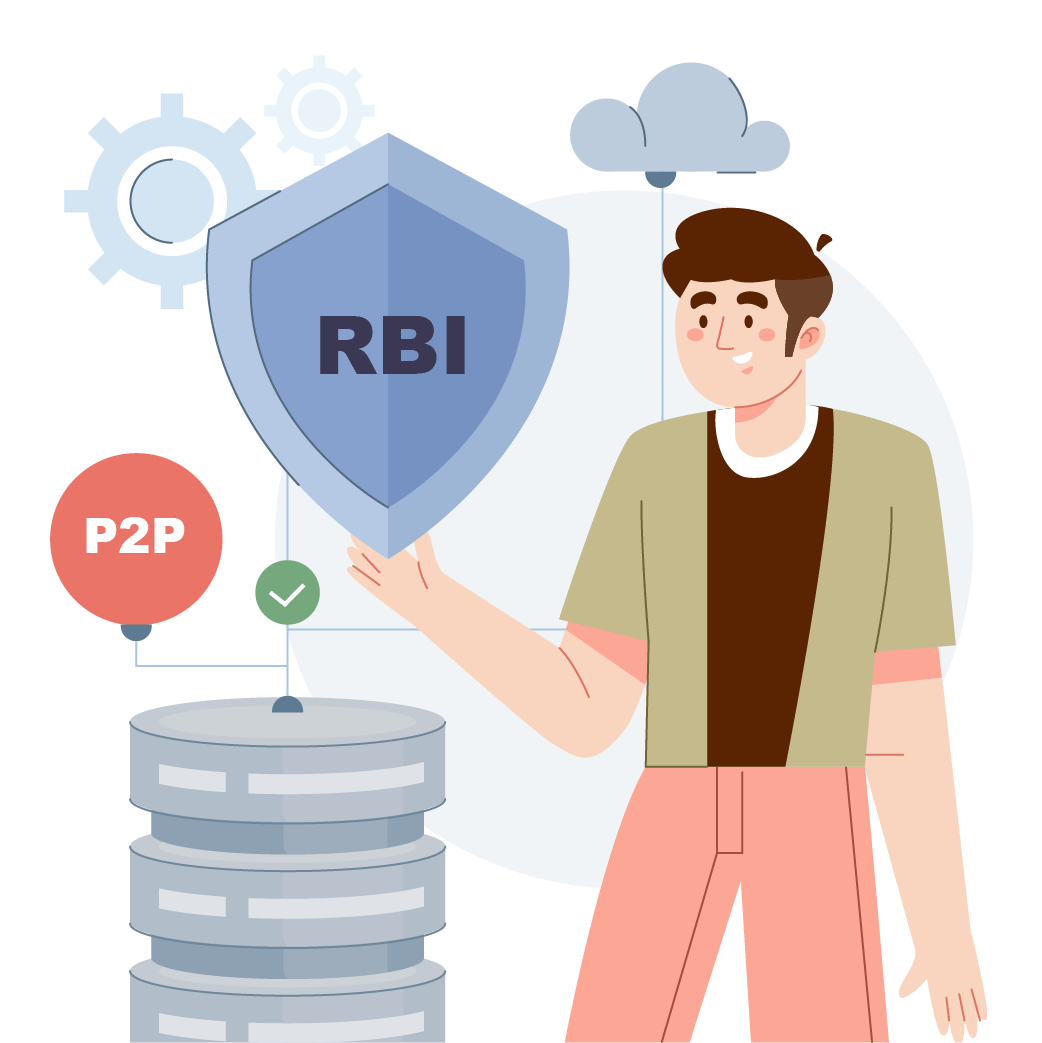RBI P2P Lending Audit Services has emerged as a new and innovative form of lending, providing a digital marketplace for lenders and borrowers to connect directly with each other. This model of lending eliminates the need for traditional intermediaries, such as banks, and offers borrowers access to funds at lower interest rates, while providing lenders with higher returns on their investments.
The P2P lending industry has been growing rapidly in India, with many new platforms entering the market. However, with this growth comes the need for increased regulation and risk management. The Reserve Bank of India (RBI) recognized this need and introduced guidelines for P2P lending platforms in 2017, which were subsequently updated in 2020.
The RBI guidelines aim to ensure that P2P lending platforms operate in a fair, transparent, and secure manner, and protect the interests of lenders and borrowers. These guidelines cover various aspects of P2P lending, including registration requirements, prudential norms, borrower and lender eligibility criteria, transparency and disclosure norms, and reporting requirements.
Given the risks associated with P2P lending, such as credit risk, operational risk, and fraud risk, it is essential for platforms to have proper risk management mechanisms in place. This is where Securium Solutions can help.
Securium Solutions offers RBI P2P Lending Audit Services that help P2P lending platforms comply with regulatory requirements and manage risks effectively. Our team of experienced professionals specializes in auditing P2P lending platforms and providing customized recommendations to improve their operations and enhance their credibility.
P2P lending platforms have become a popular alternative to traditional lending institutions, providing borrowers with access to credit at lower interest rates, while offering investors the opportunity to earn higher returns on their investments. However, like any other financial product, P2P lending also comes with its own set of risks and challenges.
Firstly, there is the risk of default by borrowers, which can lead to significant losses for lenders. Moreover, since P2P lending platforms operate in a digital environment, they are also vulnerable to various forms of cyber-attacks, such as hacking, phishing, and identity theft, which can compromise the security and privacy of the platform’s users.
Furthermore, there is a need to ensure that RBI P2P Lending Audit Services operate in a fair, transparent, and responsible manner, protecting the interests of both lenders and borrowers. This is particularly important given the fact that many P2P lending platforms operate in a largely unregulated environment.
The RBI’s guidelines for P2P lending platforms aim to address these concerns by providing a regulatory framework that ensures fair practices, transparent operations, and adequate risk management. Compliance with these guidelines is mandatory for all P2P lending platforms operating in India.

Key Advantages of RBI P2P Lending Audit Services

Undertaking an RBI P2P Lending Audit Services can offer several key advantages for P2P lending platforms. Here are some of the benefits that platforms can gain from conducting an RBI P2P lending audit:
Compliance with regulatory requirements: Compliance with the RBI’s guidelines for P2P lending platforms is mandatory for all platforms operating in India. Conducting an RBI P2P audit can help platforms ensure that they are compliant with these guidelines, which can prevent potential penalties, legal issues, or reputational damage.
Improved risk management: P2P lending platforms face various risks, including credit risk, liquidity risk, and operational risk. An RBI P2P lending audit can help platforms identify potential risks and offer recommendations to improve risk management processes. This can help platforms protect lenders’ and borrowers’ interests and enhance the stability of the platform.
Customized recommendations: An RBI P2P lending audit can provide customized recommendations to address specific challenges and areas for improvement for each platform. This can help platforms enhance their risk management processes, improve transparency, and operate more efficiently.
Competitive advantage: Conducting an RBI P2P lending audit can also offer a competitive advantage to platforms by differentiating them from their competitors. Platforms that are compliant with regulatory requirements and demonstrate a commitment to responsible operations can attract more investors and borrowers and grow their customer base.

Planning and scoping: The first step in an RBI P2P lending audit is to define the scope and objectives of the audit. The audit team will work with the platform to understand its operations, processes, and risks to determine the areas that need to be audited.
Risk assessment: Once the scope is defined, the audit team will conduct a risk assessment to identify potential risks and their impact on the platform. The team will also evaluate the platform’s risk management processes and controls to identify any gaps or areas for improvement.
Fieldwork and data collection: The audit team will then perform fieldwork to gather evidence to support the audit findings. This may involve reviewing documentation, conducting interviews with key stakeholders, and performing testing on the platform’s operations and controls.
Analysis and reporting: After the fieldwork is completed, the audit team will analyze the evidence gathered and prepare a report summarizing the audit findings.
Follow-up and monitoring: After the audit report is submitted, the audit team may continue to work with the platform to implement the recommended improvements. The audit team may also conduct follow-up reviews to ensure that the platform has taken appropriate action to address any issues identified during the audit.
The RBI has released a consultation paper on the regulation of P2P lending platforms in India. The paper aims to address the issues related to the operation, risk management, and transparency of P2P lending platforms. The paper provides guidelines on the registration process, capital requirements, and disclosure norms for P2P lending platforms. It also emphasizes the need for proper risk management mechanisms, including credit assessment, monitoring, and recovery procedures. Securium Solutions ensures that your P2P lending platform complies with the RBI guidelines and other regulatory requirements, as mentioned in the consultation paper.


Expertise in P2P lending audits: Securium Solutions has extensive experience in conducting P2P lending audits and Cyber Security & Compliance Services, including RBI P2P lending audits. Our team of auditors has a deep understanding of the regulatory requirements for P2P lending platforms and can provide customized recommendations to improve risk management processes and compliance with regulatory requirements.
Industry-specific knowledge: Securium Solutions has a strong understanding of the P2P lending industry and the unique challenges faced by P2P lending platforms. We stay up-to-date with industry developments and trends, enabling us to provide relevant and valuable insights to our clients.
Tailored approach: We understand that every P2P lending platform is unique, with its own set of risks and challenges. That’s why we take a tailored approach to each audit, working closely with our clients to understand their specific needs and requirements.
Quality assurance: At Securium Solutions, we maintain the highest standards of quality assurance in all our audit engagements. We have a rigorous quality control process in place, ensuring that our audit procedures and findings are accurate, reliable, and in compliance with professional standards.
Client-focused service: We prioritize our client’s needs and work closely with them to ensure that their audit objectives are met. We pride ourselves on providing timely, responsive, and personalized service to all our clients.
As an RBI P2P Lending Audit Service provider, we understand that clients have many questions about the process and the security of their mobile applications. Here are answers to some of the most common questions that we receive:
The cost of an RBI P2P lending audit will depend on several factors, such as the size and complexity of the platform being audited, the scope of the audit, and the expertise of the audit firm conducting the audit. It is important to obtain a detailed quote from the audit firm before engaging in their services.
The duration of an RBI P2P lending audit will also depend on several factors, such as the size and complexity of the platform being audited, the scope of the audit, and the audit firm’s schedule. Typically, an audit can take several weeks to several months to complete.
The audit process typically involves several steps, including planning and scoping, risk assessment, fieldwork and data collection, analysis and reporting, and follow-up and monitoring. The audit firm will work closely with the platform to understand its operations, processes, and risks, and will provide recommendations to improve risk management processes and compliance with regulatory requirements.
An RBI P2P lending audit can provide several benefits, such as identifying potential risks and vulnerabilities in the platform’s operations, enhancing risk management processes, improving compliance with regulatory requirements, and enhancing investor confidence in the platform.
To ensure that the audit is conducted effectively, it is important to choose an audit firm with experience in conducting P2P lending audits and a strong understanding of the regulatory requirements for P2P lending platforms. It is also important to work closely with the audit firm to define the scope and objectives of the audit and to provide any necessary documentation and information.
The audit findings may be shared with regulators if required by law or if the platform chooses to do so voluntarily. However, the audit findings are typically confidential and are shared only with the platform and its stakeholders.
If you have any additional questions like What is RBI P2P Audit Services? and RBI P2P Lending Audit Services, please don’t hesitate to contact us. We are always here to help and provide the highest level of protection for your P2P Lending Audit Services.